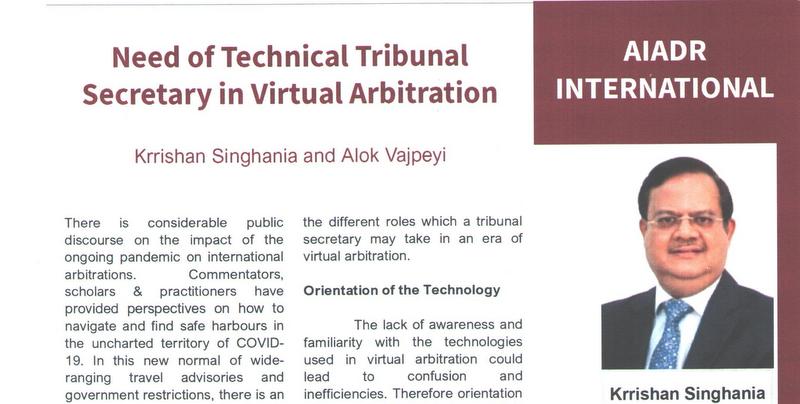There is considerable public discourse on the impact of the ongoing pandemic on international arbitrations. Commentators, scholars & practitioners have provided perspectives on how to navigate and find safe harbours in the uncharted territory of COVID-19. In this new normal of wide-ranging travel advisories and government restrictions, there is an emerging consensus to better integrate the use of technology with dispute resolution.
All the major arbitral institutions across the globe have observed increased use of electronic filings, virtual evidentiary hearings, and online case management, and these mechanisms are now being applied at pace in international arbitrations. The Covid-19 pandemic has essentially changed the way the arbitrations are functioning across the globe. This has resulted in demand of technical secretaries who can better assist the tribunal in conducting the virtual arbitrations.
Delegation of administrative and non-substantive work to the juniors by the adjudicators is not novel as a concept. In international arbitration, the use of tribunal secretaries is not alien as it helps in efficiency in arbitration. However, due to the current pandemic, the role of tribunal secretaries has been impacted as use of technology has increased in conducting virtual arbitrations. This article discusses the different roles which a tribunal secretary may take in an era of virtual arbitration.
Orientation of the Technology
The lack of awareness and familiarity with the technologies used in virtual arbitration could lead to confusion and inefficiencies. Therefore orientation of the technologies being used is essential for the participants in order to better conduct the virtual arbitration. The various technological platforms required in the virtual arbitration include a video conferencing platform, document sharing platform, transcription and interpretation services platform.
The technological platform used for the video conferencing should be decided on the basis of availability of breakout rooms, option of screen sharing, data security, video quality, end to end encryption, waiting room/lobby. The participants need to be guided as to how to use the feature of breakout rooms or how screen sharing can be done. Therefore the tribunal secretary should be well aware about the usage of different platforms like Cisco Webex, Bluejeans, Microsoft Teams, Zoom etc.
The virtual arbitration will also include the usage of document sharing software for sharing of written pleadings, procedural orders, witness statements, exhibits, authorities etc. Platforms like Knovos Arbicomm, Nuix Discover, Transperfect and Epic are few of the platforms specifically made for document sharing in Arbitration. The tribunal secretary should know how these platforms work and accordingly should orient the participants involved.
Setting up the Technology
The tribunal secretary can take up the role in setting up the technology before each virtual hearing. This would include conducting a test run before each virtual hearing and checking whether the available technology being used by the parties, witnesses and counsels meet the minimum technological requirements or not. This would further involve checking the audio/video quality, transmission speed available with each of the participant, camera angles etc.
The tribunal secretary needs to be aware about how to check the minimum transmission speed or the bandwidth, so that he can check whether the minimum requirements as laid down by the arbitral tribunal are met or not. If not specifically prescribed by the tribunal then the tribunal secretary needs to be aware of the general standards. For example, Article 5.1 of the Seoul Protocol on Video Conferencing recommends that minimum transmission speeds should not be less than 256 kbs/second.
The tribunal secretary should also be in the position to deal with any technological glitches which may occur during the conduct of the virtual arbitration.
Managing Document Storage
As stated above, in the case of virtual arbitration there would usually be a platform dedicated for document sharing and document storage. The tribunal secretary needs to ensure that the documents are securely stored and are deleted once the arbitration is over or as mentioned in the procedural order. The tribunal secretary has to make sure that the parties comply with the deadlines mentioned in the procedural orders for submissions of claims, defence and witness affidavits by sending reminders to the representatives of the parties.
Assistance during Witness Examination
Witness examination is most critical in virtual arbitration as the credibility of the witness, the demeanour, interventions, objections requirement and witness coaching needs to be monitored. The tribunal secretary can play a vital role in ensuring proper conduct during witness examination in virtual arbitration.
In order to prevent witness coaching, the tribunal may order the witness to share their screens and the tribunal secretary should keep a watch on the screen of the witness. Alternatively, if possible, the tribunal secretary can also be physically present at the same venue as the witness in order to protect any kind of witness coaching.
Witness examination may also require transcription and interpretation services. The tribunal secretary can arrange for the required transcription and interpretation services and can coordinate with the service providers. In the test run conducted before the actual hearing, these services should also be used.
Cost of the Tribunal Secretary
The parties might be concerned with the cost involved in the appointment of these technical tribunal secretaries. However, considering that virtual arbitration reduces travel costs and other related ancillary costs, the appointment of a tribunal secretary for efficient dispute resolution in a virtual mode should be definitely considered by the parties and the arbitral tribunal.
The HKIAC in 2014 published its Guidelines on the Use of a Secretary to the Arbitral Tribunal (HKIAC Guidelines). It clearly demarcates the duties which the tribunal secretary can perform. Guidelines No. 4 of the HKIAC Guidelines mentions about the remuneration aspect of the tribunal secretary. It provides that the arbitral tribunal in consultation with the parties should determine the fee of the tribunal secretary. It can be either on per hour basis or certain percentage of the tribunal fee can be given to the tribunal secretary.
The Young ICCA also issued the Young ICCA Guide On Arbitral Secretaries containing the roles and duties of tribunal secretaries (Young ICCA Guidelines). Article 4 of the Guidelines states that the remuneration of the arbitral secretary should be reasonable and proportionate to the circumstances of the case and should be transparent from the commencement of the arbitration. It also contemplates that the parties can pay the secretary on the hourly rate or the tribunal can pay the secretary from its own fees.
The above mentioned guidelines need to be revised in order to better lay down the roles of the tribunal secretaries in virtual arbitrations. Apart from assisting the institutions, these revised guidelines will also act as a guidance to the tribunal secretaries appointed in the ad hoc tribunals.
Conclusion
Traditional roles of tribunal secretaries have become more relevant in the context of virtual hearings. These tribunal secretaries now need experience and understanding of the functioning of the technologies being used in virtual arbitration and the issues commonly faced by the concerned parties. Arbitral institutions have been taking measures to ensure that the case managers and tribunal secretaries are well versed with these technological processes. For example, the Singapore International Arbitration Centre has initiated the training of their counsels by the technical officers of various firms who use these technologies regularly.
The arbitral institutions are better equipped to service the parties engaged in virtual arbitration by training their case managers. However, ad hoc tribunals doing virtual arbitrations would require a need of technical tribunal secretary to assist the tribunal in managing the technology and other administrative work.
While the above list of the roles of the technical tribunal secretary is not exhaustive and are just illustrative in terms of virtual arbitration, the arbitral tribunal may also assign specific technology related work or other administrative work to the tribunal secretary as mentioned in the HKIAC Guidelines and Young ICCA Guidelines.






